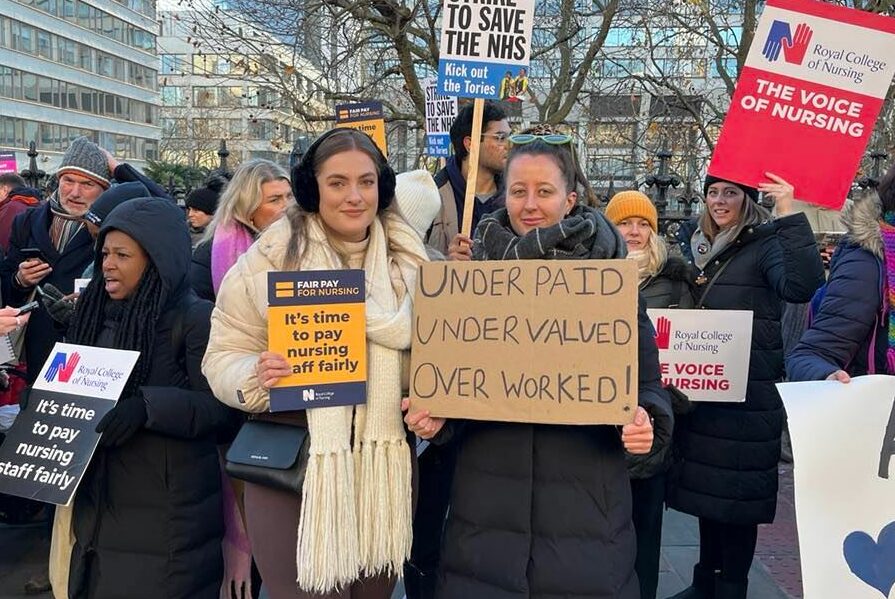 Striking RCN nurses, St Thomas's Hospital. Photo: Shabbir Lakha
Striking RCN nurses, St Thomas's Hospital. Photo: Shabbir Lakha
Members of the Royal College of Nursing began their first day of strike action on Thursday to demand fair pay and patient safety. Counterfire members report from the picket lines
Nurses with the Royal College of Nursing began striking for the first time in their history on Thursday morning. Picket lines were set up outside hospitals across the country and nurses and supporters gathered in sub-zero temperatures to fight for the future of the NHS.
The real-terms cuts to nurses pay, the scrapping of the bursaries for student nurses, and the underfunding and not-so-stealthy privatisation of the NHS have resulted in a massive retention crisis and a huge number of vacancies for nurses. This in turn has meant ever-increasing workloads and declining patient safety.
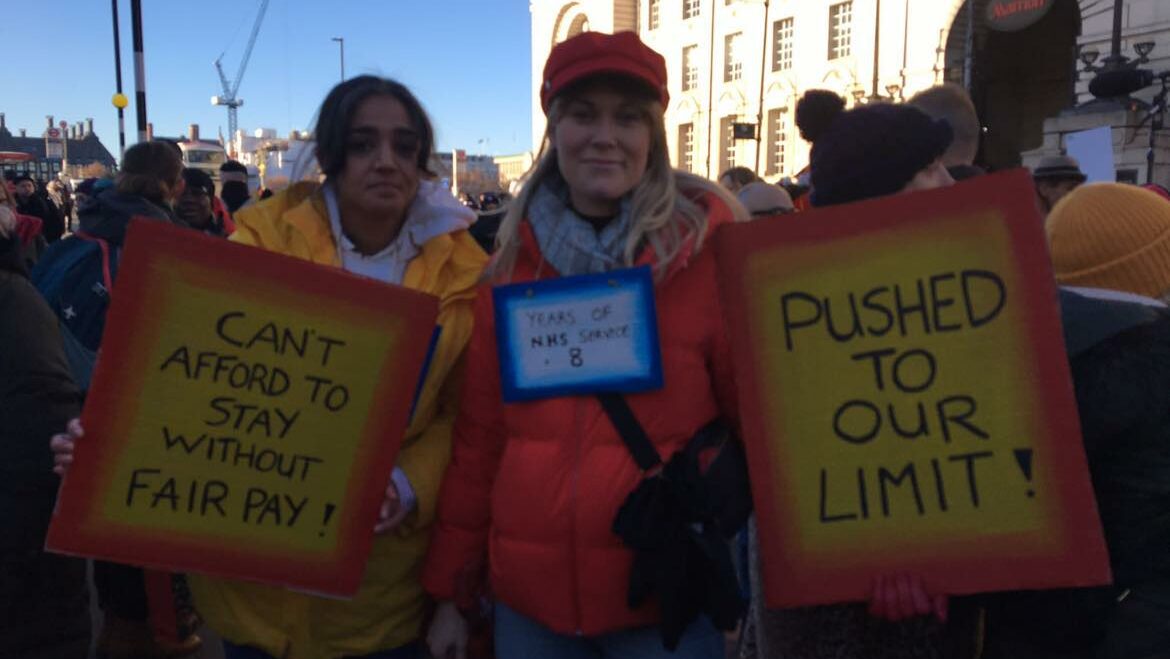
The nurses are right to say this isn’t simply an issue of them being paid fairly but about the ability of the NHS to function at all.
Stacey Richardson, a striking staff nurse in Newcastle, told the local press:
“This isn’t just about pay. It’s about safe staffing, safe patient care, this is about mams, dads, brothers, sisters, grandparents and children. It’s about protecting families.”
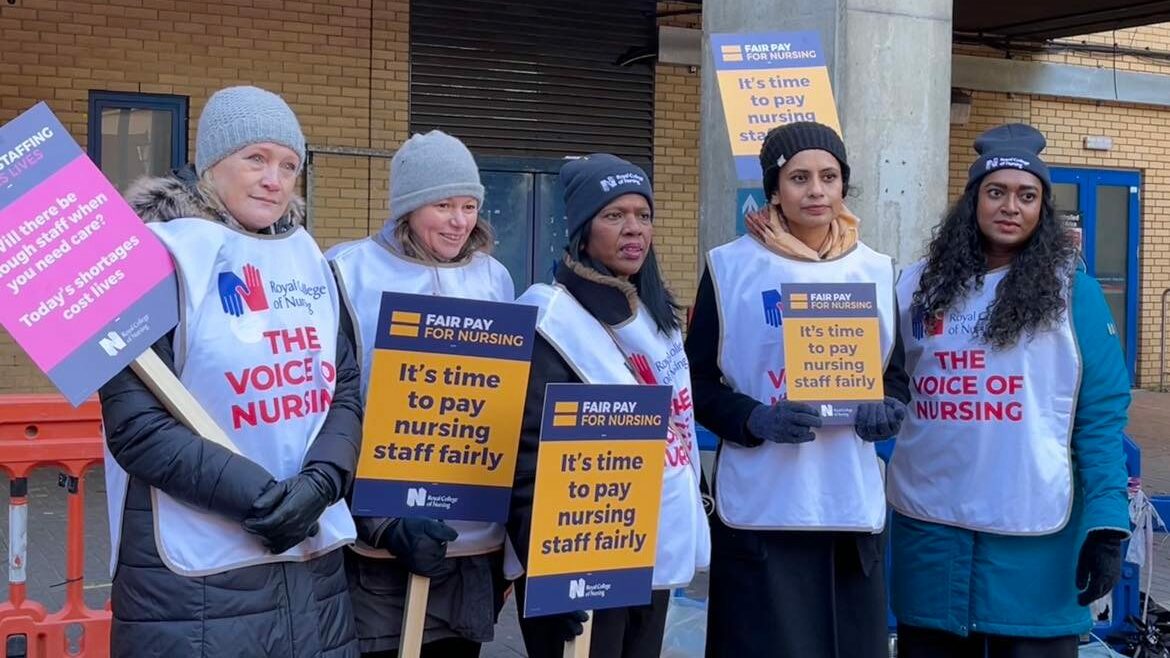
Ellen Grogan, an RCN picket line supervisor at St Mary’s Hospital London told Counterfire:
“I feel that it’s a watershed moment. That actually, if we carry on, which we intend to do, really there is a possibility that this could be a pivotal moment in saving the NHS. It’s our responsibility to stand up for the NHS, to stand up for patients, and to make clear that the NHS belongs to the public. This is the battle we’re engaged in.”
When asked if the Tories are deliberately undermining the NHS, Tom Lock Griffiths, a campaigner with Keep Our NHS Public, told PoliticsJoe,
“I think it’s a violent attack on this service. They did it, Conservative governments historically, around the railways and so on – they are actually, consciously undermining the service. When you do that with something like the NHS, it means people die.”
The nurses’ struggle gets to the heart of the Tory government’s austerity agenda and its determination to gut public services and drive down wages. This was acutely recognised on the picket lines as members of unions in other public services came to show their support. As Mick Lynch said at the St Mary’s Hospital picket line in London:
“The pillars of our institutions of the welfare state: the NHS, the railways, the postal service, education, care for our elders and the vulnerable – all of it’s at stake. And what we’ve got here is a government that’s determined to run down those services as low as possible, to make the workers in those services as despondent as possible… We can’t allow that to happen. What we’ve got to do is join up all of our struggles.”
“Your fight is our fight” was a common phrase issued by trade unionists from other unions, left wing MPs and campaigners from a wide range of groups who spoke on picket lines in support of the nurses. Feyzi Ismail, Co-Secretary of Goldsmiths UCU, explained the similarity with the attacks on higher education and the growing feeling among workers that now is the time to fight back:
“You’re on strike, the RMT is on strike, the postal workers are on strike, others are saying: ‘actually, our conditions aren’t great, why don’t we go on strike?’ I think solidarity is key here.”
All over the country, picket lines were loud, angry and determined. There was a huge amount of support from other health workers, especially ambulance drivers who will be striking as well next week, and from the public with constant hooting from passing cars and buses. At St Thomas’ Hospital in London, hundreds of people gathered at lunchtime to rally behind the nurses.
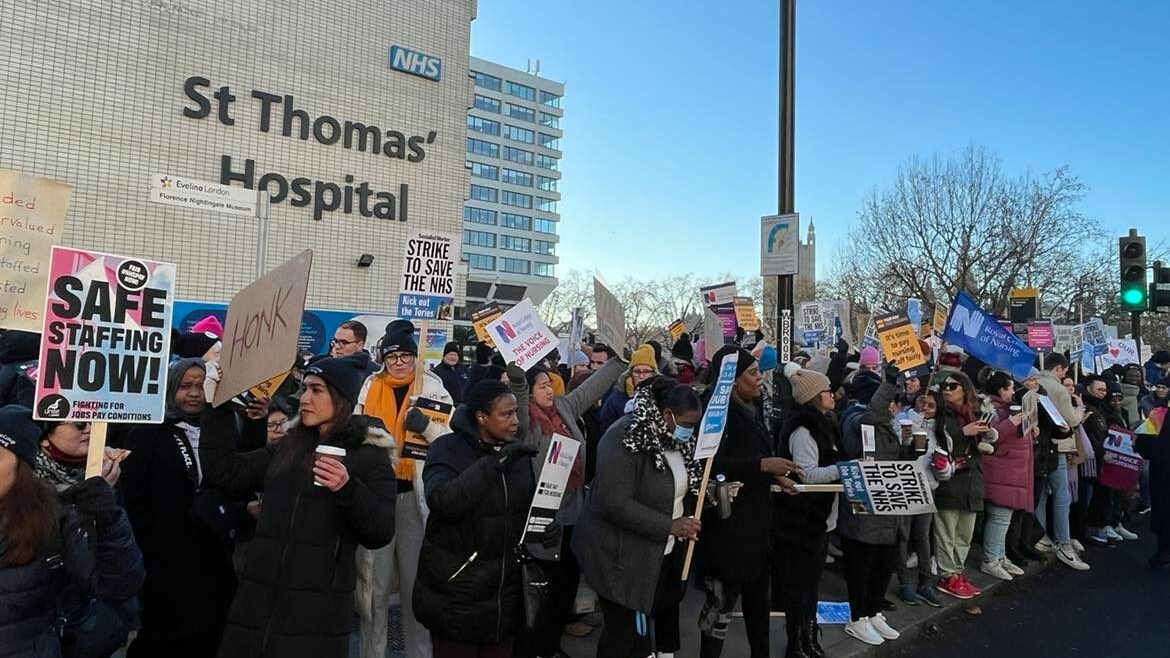
In some NHS trusts where there wasn’t an RCN picket line, other health unions organised solidarity rallies. Alia Butt from NHS Staff Voices reported from a rally at Homerton Hospital:
“It was wonderful to see so many turn out in solidarity of over 100,000 striking nurses across the country. Although strike action was not voted for at Homerton Hospital, everyone we spoke to was hopeful that the situation will soon be different and they will be joining the action in the future. Everyone who passed honked their horns, a patient brought us jaffa cakes and chocolates and the ambulances driving to and from the hospital made it clear they were very grateful for the crowd’s support.
“We were joined by comrades from the UCU, CWU and the local mayor, who condemned the Tory party chairman’s bizarre suggestions that striking workers are playing into the hands of Putin. The desperate politicians may be going mad but it seems the public are seeing more sense by the day!”
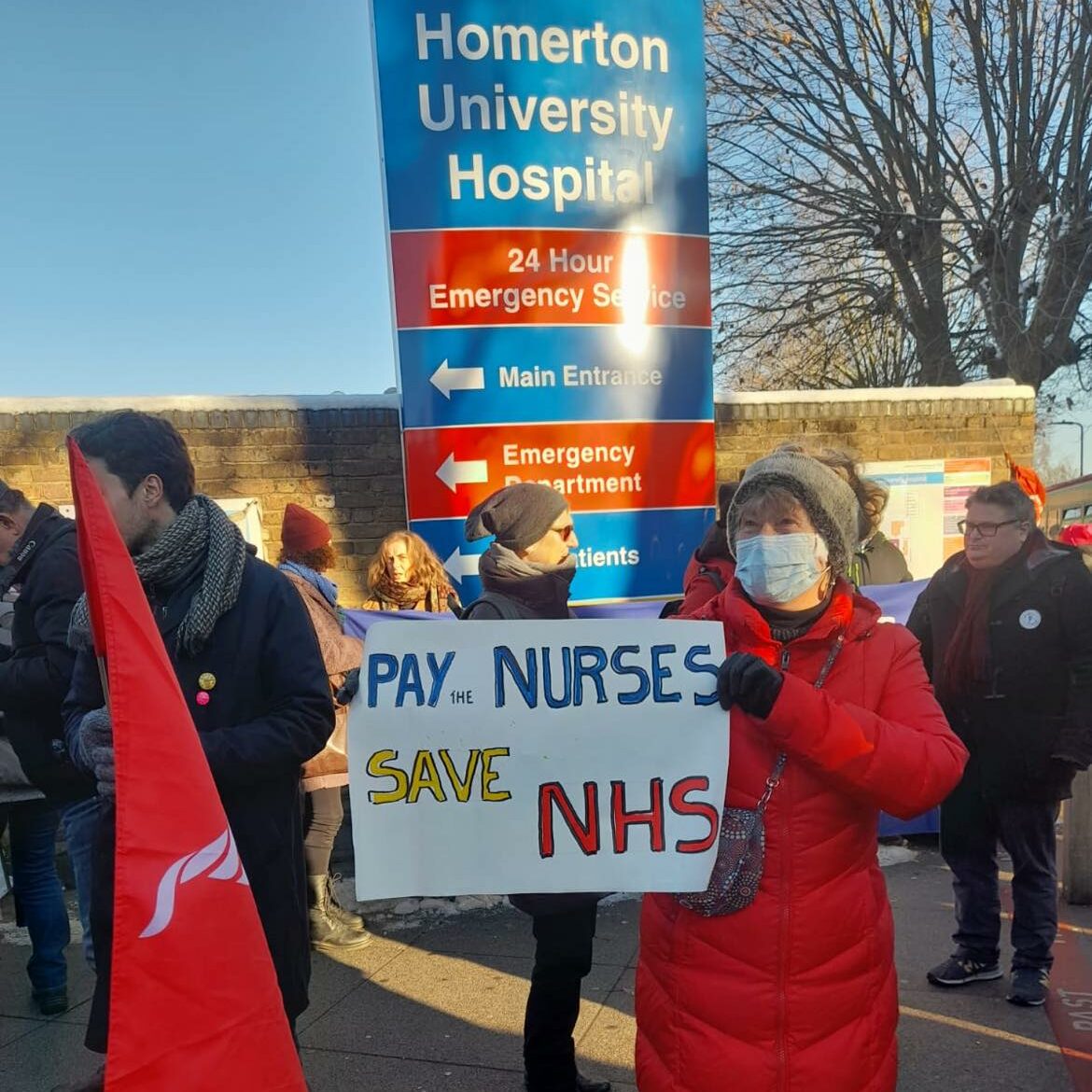
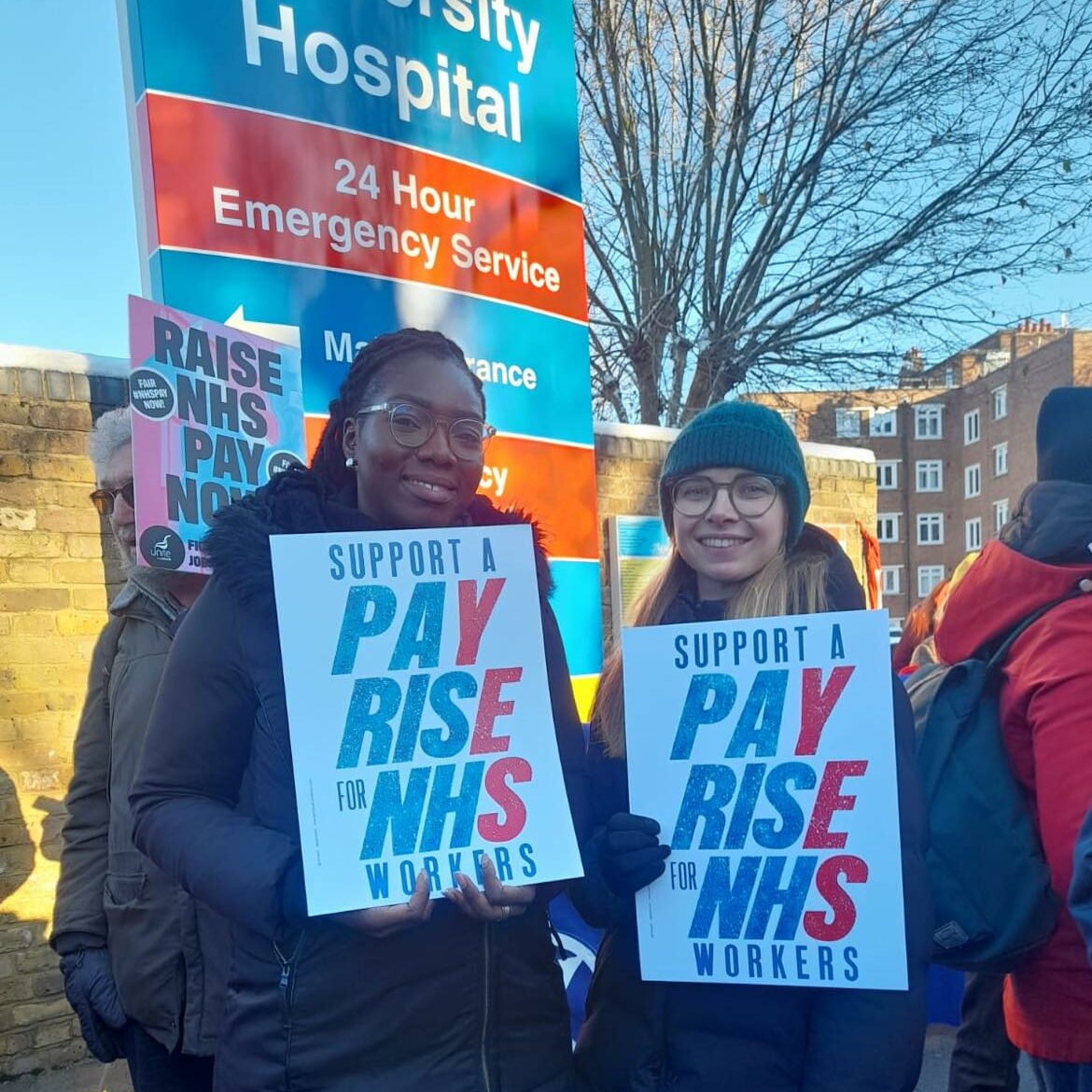
The nurses will be back on strike on Tuesday 20 December. Get down to your nearest picket line, and in London, join the march from UCLH in Euston assembling at 2:30pm and going to Downing Street. Ambulance workers with GMB, Unite and Unison will be joining the action the following day.
On Tuesday evening, Counterfire has organised an online public meeting with health workers taking action to hear their experiences from the frontlines and to discuss how we can make the fightback as effective as possible. Register on Zoom here.
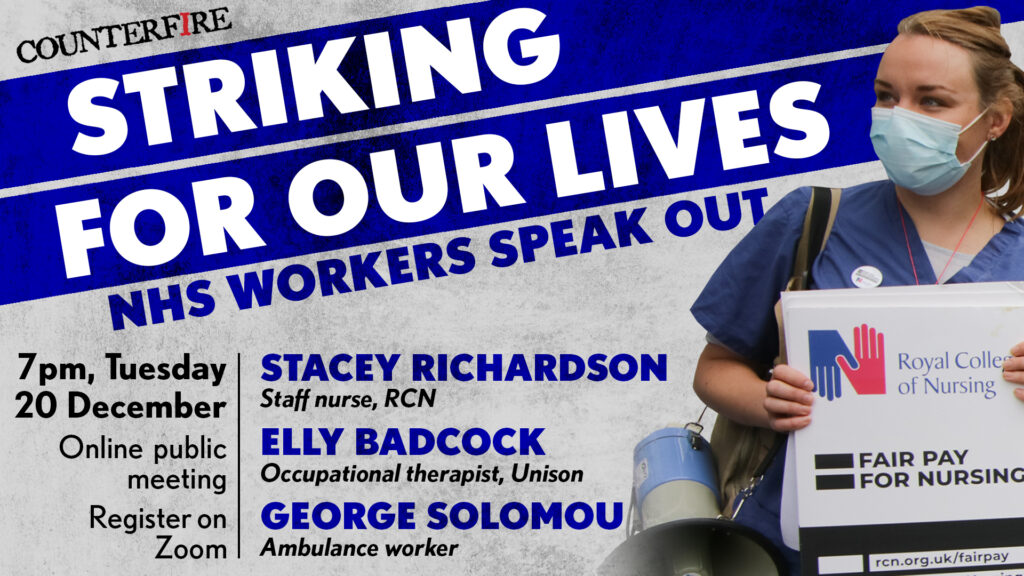
Join Revolution! May Day weekender in London
The world is changing fast. From tariffs and trade wars to the continuing genocide in Gaza to Starmer’s austerity 2.0.
Revolution! on Saturday 3 – Sunday 4 May brings together leading activists and authors to discuss the key questions of the moment and chart a strategy for the left.

